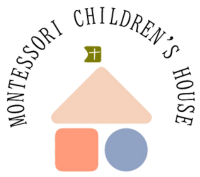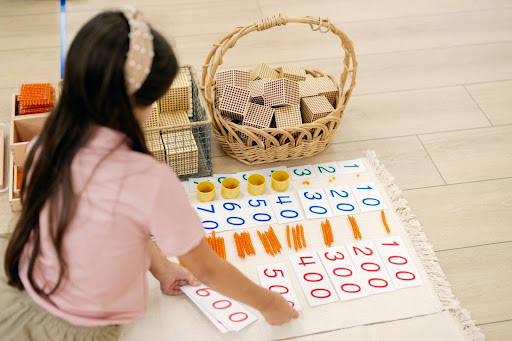When you entrust your child’s early years to Montessori Children’s House of Miami Lakes, you get more than just a preschool. You get a faith-based Montessori environment where each child matters.
Our mission is rooted in independence, positivity, respect, and love, with daily experiences shaped to support each child’s spiritual, emotional, academic, and physical growth. In this post, we’ll explore concrete Montessori activities that foster real and lasting development.
Why Montessori Activities Matter: The Foundations of Growth
Children are naturally curious, and Montessori education focuses on the times when children are particularly ready to learn about language, order, movement, or relationships. A thorough approach ensures that children learn best by doing, rather than passively listening. A prepared environment, materials that often self-correct, freedom within limits, consistent order, and loving guidance help children build concentration, confidence, and inner motivation.
These core principles are not abstract. They should be lived out in daily Montessori activities, from pouring water and reading stories to exploring textures and learning letters. Each activity simultaneously strengthens multiple domains of development.
Practical Life Skills For Real-World Confidence
Practical life skills are everyday routines and tasks that enable children to perform tasks independently and care for their personal space. They build independence, coordination, order, and self-esteem.
Here are some examples:
- Pouring and transferring: Using a pitcher, ladle, or spoon, children transfer water or dry materials, such as rice, from one pitcher or bowl to another. This builds hand-eye coordination, patience, and concentration while teaching the importance of order.
- Fastening frames: Zippers, buttons, snaps, and laces help children practice self-dressing, fine control, and perseverance.
- Sweeping, dusting, and cleaning: Child-scaled tools let children participate in caring for their space, fostering responsibility, respect, and pride in a job well done.
We integrate spiritual values into these tasks. Caring for the environment is part of caring for God’s creation, and helping others is part of developing kindness and service.
Sensorial Exploration: Sharpening Perception
As children actively engage with their surroundings, they refine their ability to discriminate between various sensory qualities, including size, shape, color, texture, sound, and more. These skills underlie stronger reasoning, math, logic, and aesthetic appreciation.
Some of the activities you might see or try include:
- Color matching or gradient tablets: Learning to match shades, or arranging from light to dark, helps with perception and focus.
- Sound cylinders or matching sounds: Children match items by listening to containers with different fillings to enhance auditory discrimination and concentration.
- Rough and smooth boards, thermic bottles, and texture baskets: Feeling different textures and comparing variables like hot/cold and rough/smooth builds sensory vocabulary and observation skills.
Each of these sensorial experiences helps children begin to notice detail, make comparisons, sort, and classify. That helps lay a solid foundation for cognitive growth and logical, mathematical thinking.
Language Development: Cultivating Communication and Literacy
Language is central to all preschool learning. Through Montessori activities focused on language development, children strengthen their listening, speech, reading readiness, and expressive skills.
Language-rich activities include:
- Sandpaper letters and tracing: Children trace tactile letters while hearing the sound. This helps with phonetic awareness, letter shape recognition, and early writing skills.
- Storytelling, object naming, and vocabulary cards: Using real objects, images, and stories opens pathways to new vocabulary and expressive ability.
- I-spy and sound games: Identifying beginning sounds, finding words matching a clue, and playing games that tease out phonemes and letters build a strong analytical foundation.
Our learning environment supports language development with materials that are accessible, beautiful, tactile, and aligned to readiness. Our faith component also encourages story and narrative, helping language flourish in moral, spiritual, and relational dimensions.
Fine Motor Activities That Strengthen Hands and Focus
Fine motor skills are essential to practical life and sensorial work. Subject activities involve small, precise movements of hands and fingers, developing the physical skills necessary for writing, working with tools, and other tasks.
Talk with us to observe how we help children improve coordination and concentration through:
- Bead threading, jewel picking, and tweezers transfer: Moving small beads or objects enhances finger strength and coordination.
- Pin punching or perforation: Pushing holes in paper along lines or shapes improves grip, control, and attention to detail.
- Tracing, drawing, and cutting with scissors: These early tasks encourage coordination with both hands, control, and patience.
Playful Learning and Activities for Boosting Cognitive Growth
Playful learning involves activities that feel like play but are deeply structured to support cognitive growth, including problem-solving, logical thinking, memory, pattern recognition, early math, and classification.
Some examples of these enjoyable Montessori activities include:
- Counting work, number rods, and bead stairs: Concrete materials help children match quantities, order numbers, and visually see math concepts.
- Sorting and classifying objects: Shells, buttons, and blocks sorted by shape, color, and size help children identify attributes, distinguish categories, and see patterns.
- Knobbed puzzles or shape puzzles: Children learn spatial reasoning by fitting pieces into places and recognizing shapes.
- Puzzle maps and globe exploration: These activities introduce geography, cause and effect, and foster a deeper curiosity about the wider world.
How You Can Bring Montessori Activities Home
We believe in extending learning beyond our school. Here are ways parents can participate:
- Create a prepared home learning environment with low shelves, child-sized tools, and attractive materials.
- Offer choices and freedom within limits by letting a child pick among a few appropriate tasks.
- Model activities carefully, then allow your child to try independently, using repetition and self-correction.
- Notice what your child is drawn to and let their interests guide which Montessori activities you offer at home.
Contact Montessori Children’s House of Miami Lakes To Discover More
We carefully design Montessori activities around the real ways children engage with the world. Our Montessori teachers and staff believe in raising children who are intellectually alive, spiritually grounded, socially confident, and personally equipped for strong, healthy growth.
If you’re ready to see how your child’s development can blossom in a prepared environment, with loving guides, in a Christian Montessori community, call Montessori Children’s House of Miami Lakes at (305) 823-5632 to schedule a tour or learn more. Let us walk with you in nurturing your child’s independence, curiosity, and joy in learning.

